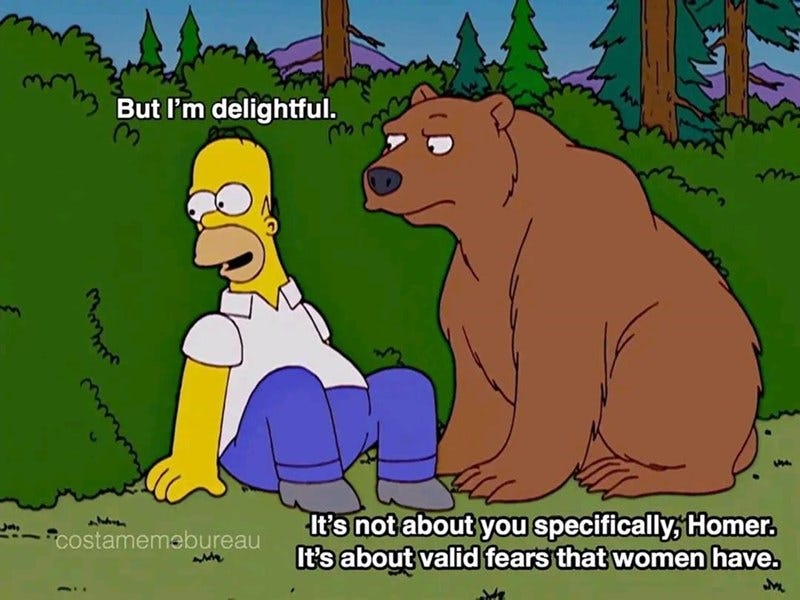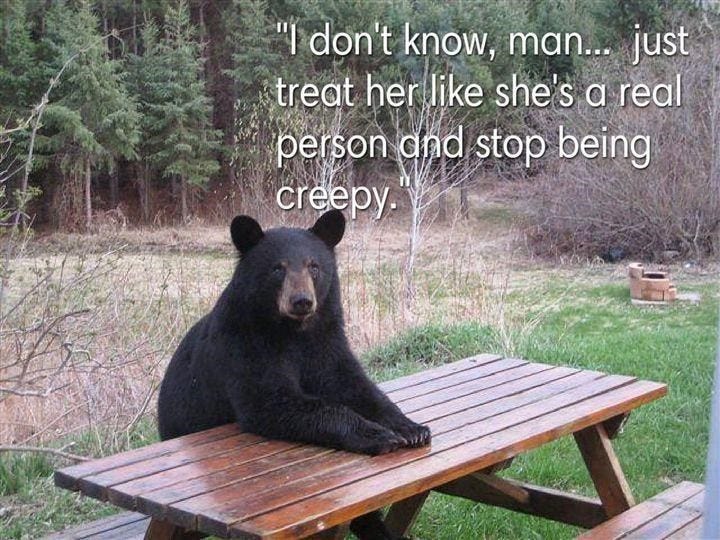Of Bears and Men
How we talk about things without really talking about things - and without listening or engaging, and without the possibility of changing our minds
View
Recently, a question (for women) was placed before the national consciousness - if alone in the woods, walking down a trail, would you rather meet a man or a bear? This question was placed before the national consciousness, as many issues are, by way of social media. In this case, a Tik Tok video. Most women said ‘bear’. The video got a lot of interaction there, and was posted on other social media platforms, where it got a lot more interaction. Columns were written, punditry was punditried, memes were memed … you know how this works.
It is evident from the video itself that the question was not taken completely seriously by all those answering it, even if they had a serious point - but much of the resulting discussion was of the deadly serious variety. Part of the initial meme-making movement was in the contest between the “it is ridiculous (and perhaps offensive to men) to say ‘bear’” people (largely but not exclusively men) vs. the “no it isn’t (and you don’t understand the danger to women)” people (largely but not exclusively women). I don’t want to try to answer the question, I want to use the question to talk about how we talk to one another - or don’t.
Those who answer “bear” aren’t necessarily giving a statistically rigorous answer, or trying to. As I understand these women, most of them are women and all who aren’t are trying to answer on behalf of women, they are communicating that they often feel unsafe in the world - because of the presence of men. If given the situation of a bear ahead of them on the trail and a man behind them, I don’t think they are saying they would run toward the bear, seeking safety from the man (even though that is where the logic of the answer would lead). They are using the question to express something else - men sometimes make women unsafe, and more often make women feel unsafe.
Those who answer “man” are usually giving what is, to them, the obvious, statistically sound, answer. While women are more often the victim of men than they are of bears, it is because they meet far, far, far, far more men than bears in their lives. Perhaps one out of hundreds of men would be less than safe, while a far greater number of bears would be less than safe. Some men are offended at the implication that they are more dangerous than a bear - and at the implication that they wouldn’t try to make a woman safe in the presence of a bear. While women are offended at the implication that the question - and therefore their fears - are silly. Many on both sides of the question feel justified in their offense. As a result, there is very little listening going on here.
Recently, a friend of mine, a woman in her late 20’s, was describing her experience at a Taylor Swift concert. She talked about leaving the concert, a part of a huge mass of people - something that would normally make her anxious. She wasn’t anxious, though. She noticed that she was surrounded by a crowd of people that was comprised almost completely of women. She told me, “I realized I’m not afraid of crowds, I’m afraid of men.” I can understand this fear even though it is completely foreign to me. It isn’t crazy for her to have this fear - and she didn’t mean to say that she was afraid of me. I think I understand what she was saying - she was telling me something real about herself and her experience in the world. I wasn’t asked to agree or disagree. She wasn’t telling me something about me. She wasn’t really trying to tell me something about all women, or even all men. She was telling me something about her.
Also recently, a friend of mine, a man of indeterminate age, was describing sitting in a room of women who were talking about the failings of the men in their lives, or even in the public eye. He described a situation which, for him, mirrored a sense in which he felt blamed for all the bad in the world simply because to him it felt like men were blamed for all the bad in the world. He told me that he is worried about his son in a world in which it seems permissible to say anything about a man and to openly favor girls over men in higher education. I think I understand what he is saying - he was telling me something real about himself and his experience in the world. I wasn’t asked to agree or disagree. He wasn’t telling me something about me. He wasn’t really trying to tell me something about all men, or even all women. He was telling me something about him.
My hunch is that you, dear reader, may be more inclined to argue against what you perceive to be the position of one of the two paragraphs above, and for the other. You may have statistics at the ready to ‘disprove’ the apparent conclusions reached by these people. Just like you might be more inclined to argue in favor for meeting a bear in the woods over meeting a man. But it isn’t really a debate about an issue or even a general statement about the world. If you watch that Tik Tok video, it is a series of women answering a question which references themselves personally. It is everyone else who is trying to make, or refute, a larger point concerning this or that.
In other words, on a range of issues, we are spring-loaded with our agreements or rebuttals. And so we don’t really listen to each other. We have little empathy for their experience in the world because we tend to immediately generalize it in one direction or another so that we can argue for it or against it. In the process, we make it about us - they, their answer, their experience, becomes a prop for our argument at best, irrelevant at worst. We could take the discussion above and replace men & women with Israel & Palestine or Republicans & Democrats or … well, lots and lots of other issues - where every possible data point becomes a jumping off point for our spring-loaded argument.
I am not saying there aren’t larger points to be made or that we shouldn’t make them, from time to time. I am not saying that our experience, or our perception of our experience (which is all we ever really have), defines reality for us or anyone else. I am saying we should listen to one another and allow for some nuance and complications in our view of the world. That our positions should not be spring-loaded, ready to be brought into argument at a moments notice. That we should exercise humility and curiosity about the world.
A little more than two years ago, when this newsletter was beginning, I wrote what was something of an introductory piece, called The Big Story. I wanted to set a background, or context, for the pieces and podcasts to follow - not a complete statement of belief, but a framework of belief serving as a foundation for what will follow. Some of that framework of belief can serve as a reminder for us here -
The Big Story in a Christian framework starts with some creation event, it all goes wrong with the fall, and this begins a journey of redemption - which will eventually be fulfilled when all will be made right.
I think we can’t fully understand ourselves, our identity, our mission, relationships, loves, losses, or our culture - without grappling with this foundational idea of story. Here is one rendering of it:
Here is the reminder - we live in a world that has been damaged by the fall, as have all of us. We are not infallible and our motives are not impeccable - and so we should look closely at ourselves with humility. Our positions and experiences are not infallible expressions of reality. At the same time, we all bear the image of God, so each of us has the ability to bear some truth to others - and so we should listen to others with curiosity. It is God’s story and we have our part to play in it.
My dear brothers and sisters, take note of this: Everyone should be quick to listen, slow to speak and slow to become angry, because human anger does not produce the righteousness that God desires.
James 1:19
We are too quick to dismiss those who are not in our camp and too quick to fall in line with those who are. We are slow to listen and we are quick to speak. We lack curiosity and seek reinforcement. We enlist an injustice of our world in order to make a point, often while doing nothing about any injustices of our world. We bathe ourselves in the glow of righteous indignation, forgetting that human anger does not produce the righteousness that God desires. Growth in us looks like movement away from all of these trends.
Links
Man or Bear - Tik Tok
The Man vs. Bear Fallacy - National Review - May 14, 2024
Man or bear? A viral question has spawned scary responses - CNN - May 6, 2024
I've spent time with bears and men. In the woods, I'd rather run into the bear. - USA Today - June 2, 2024
Who loses in the ‘man or bear’ showdown? Women. - The Washington Post - May 9, 2024









